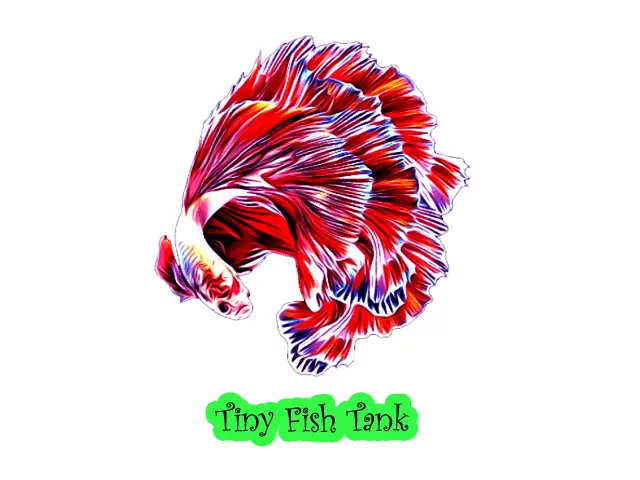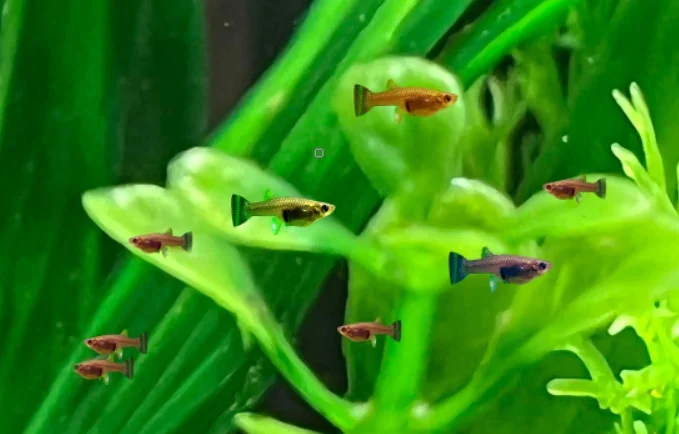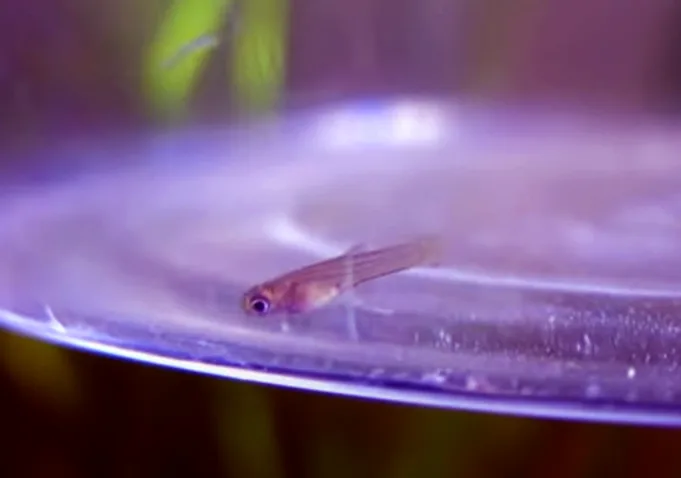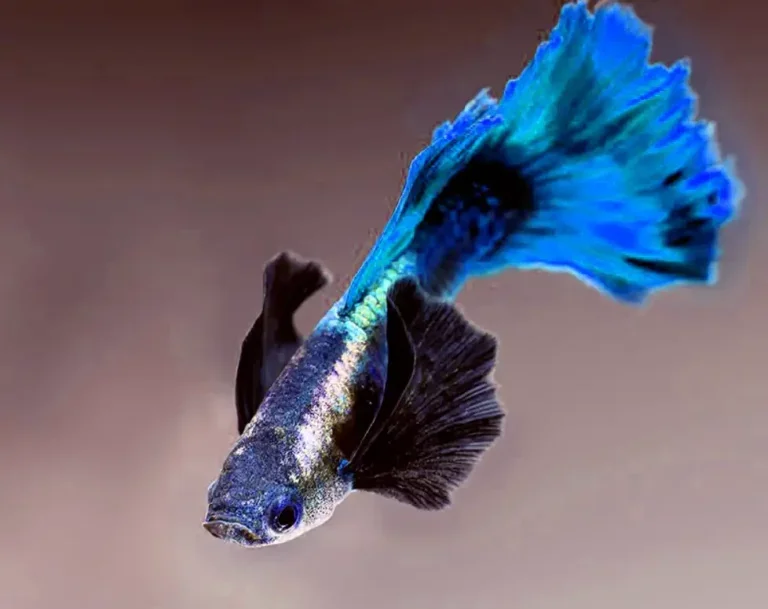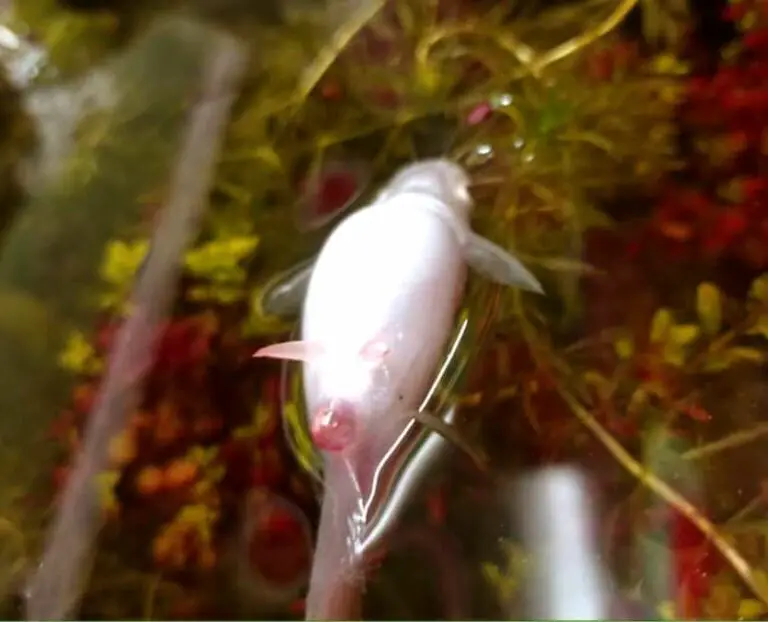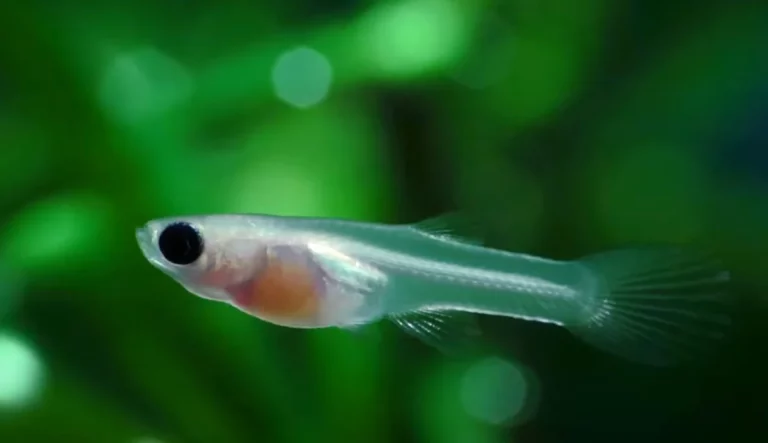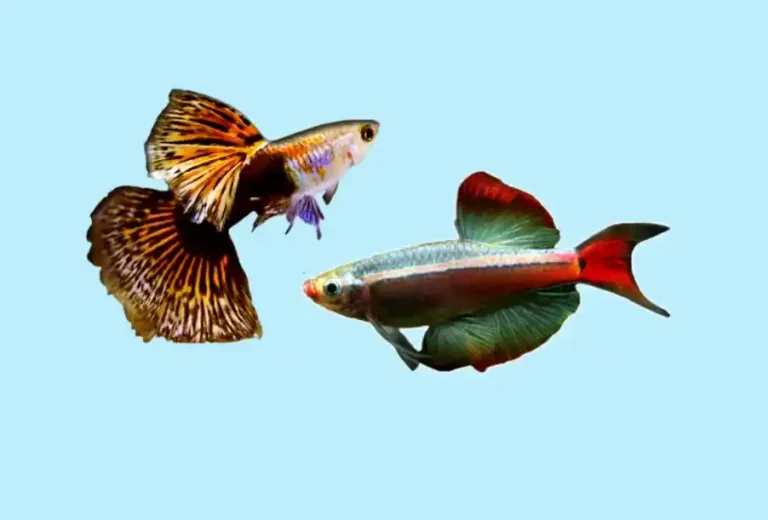Do Guppy Fish Sleep?
Guppy fish’s sleep pattern is different compared to other freshwater fish. Guppies are not bottom-swimming fish. However, you will sometimes see Guppy lying on the bottom of the tank. Do Guppy fish sleep or rest? Recent studies reveal that Guppy aquarium fish enter a sleep-like state despite lacking critical mammalian sleep structures.
The Guppy fish brain lacks a neocortex and other regions linked to humans’ REM and NREM sleep cycles. However, fish exhibit behaviors analogous to sleep. Guppy fish remain motionless at night 95% of the time, compared to 40% during daylight. This aligns with their circadian rhythms.
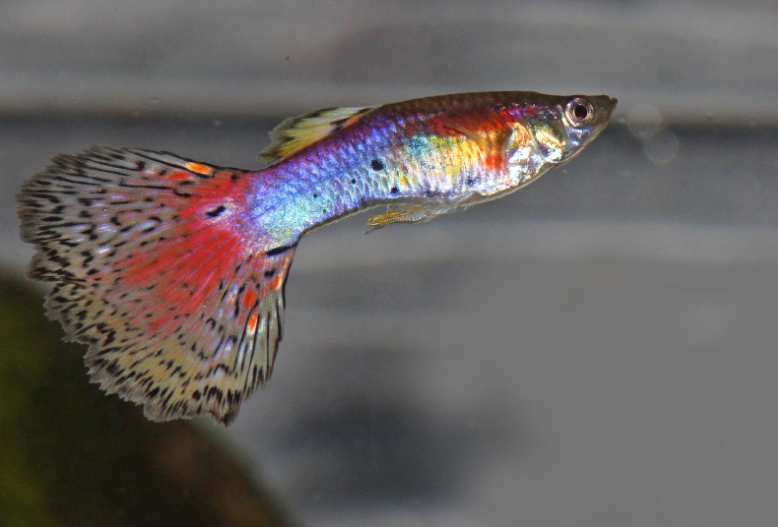
Brain wave recordings show Guppy fish have slower brain activity at night. Their response times to stimuli drop by 50-150 milliseconds, indicating reduced awareness. During rest, Guppy oxygen consumption drops by 10%-15% compared to active daytime levels, conserving energy.
So despite differences in brain anatomy, fish like Guppies undergo physiological and behavioral changes characteristic of sleep, including circadian rhythms, altered consciousness, and energy conservation. Their rest state serves similar restorative functions, though the mechanisms differ across species.
Table of Contents
- Sign And Symptoms of Guppy Fish Is Sleeping
- Typical Sleeping Spots for Guppy Fish
- Good Sleep for Your Guppy Fish
- What Does It Mean If Your Guppy Fish Sleeps Too Much?
- Distinguishing Between Sleep and Sickness
- Summary
Sign And Symptoms of Guppy Fish Is Sleeping
Guppy fish sleeping does not happen often in the daytime. Most daytime fish rest while lying on the floating plant leaf or the fish tank bottom. Here are some signs that indicate your Guppy fish is sleeping.
- Reduced Activity: Guppy fish are typically active during the day, swimming and foraging for food. They will stay still when sleeping, usually resting on the tank floor or floating motionless near the surface.
- Increased Reaction Time: Guppies sleeping take longer to react to sudden noises or movements outside the tank than when awake.
- Darker Color: The colors of a resting Guppy often appear duller or darker than usual as the fish relaxes its pigment cells.
- Irregular Breathing: Sleeping fish breathe slower and more irregularly than awake Guppies. Their gill movements may pause briefly between breaths.
- Position Near Plants/Objects: Guppies frequently sleep near plants, tank decorations, or other surfaces, presumably to feel more secure.
- Reduced Alertness: A sleeping Guppy will not actively investigate its surroundings. Its lower alertness becomes apparent if you watch the tank for a few minutes.
- Circadian Timing: Since they are diurnal, Guppies typically sleep at night or when the tank light is off, especially if the daylight/nightlight cycle is consistent.
Observing your fish at different times and looking for these signs can help determine when your Guppy fish is fully resting versus active and awake. Let sleeping fish lie!
Remaining Still for Prolonged Periods
Guppy fish remain still for prolonged periods as a sign of sleep. Here are the key points.
- Guppy fish typically sleep 6-10 hours per 24-hour cycle, often at night. During sleep, they can remain completely motionless for up to 90% of the time.
- One study found Guppies slept on average for 8.5 hours continuously at night, compared to only brief rest periods during daytime.
- Guppies frequently wedge themselves into plants or decorations in a vertical or head-up tilt position while sleeping. This still posture can persist without interruption for hours.
- Motion tracking shows resting Guppies average less than 5 minor fin movements per minute while asleep versus over 60 during regular daytime swimming.
- Their lack of response to disturbances that generally trigger an alert reaction, like tapping on the tank, indicates a deep sleep state.
- Timelapse footage reveals extraordinary decreases in Guppy fish nighttime activity levels. Sleep appears as near-total motionlessness relative to their active swimming and foraging during the daytime.
So extended periods of remaining still, especially at night and when contrasted with daytime movement, signal a Guppy fish is likely asleep and getting necessary rest.
Resting on the Tank Bottom
Guppy fish resting on the bottom is an indicator of sleep. Studies show Guppy fish spend over 90% of their sleep time resting motionless on the tank floor, often wedged into plants or ornaments. Their preference is to sleep near structures that offer protection and support. Guppies feel more secure sleeping against objects than exposed to open water.
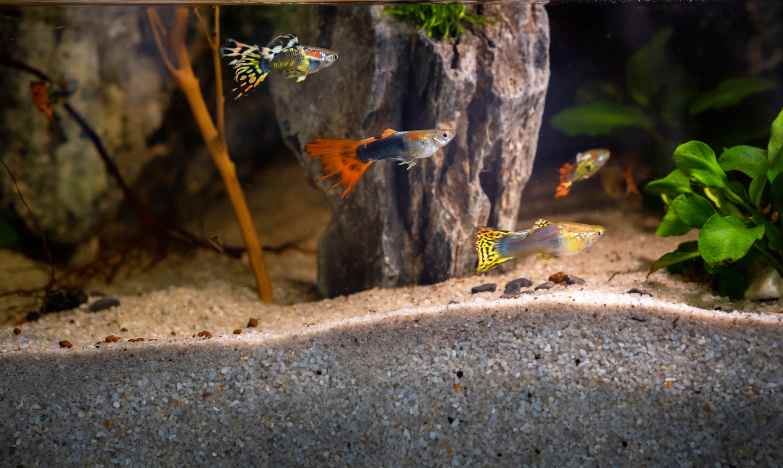
Under natural conditions, Guppies would use rocks, logs, and vegetation to stabilize themselves during sleep near the water bottom. In aquariums, artificial decor provides similar support.
While bottom-resting, Guppies maintain a horizontal body orientation, with dorsal and caudal fins typically folded against the body to streamline their profile. During sleep, respiration rates fall below 60 breaths per minute, allowing the motionless fish to sink gradually to the bottom and remain undisturbed.
Daytime observation reveals significantly more mid-water swimming. Descent to the bottom for an extended stay, especially at night, signals resting Guppy fish.
So, Guppy fish positioning on the tank floor, aided by decorations, reflects a natural sleep posture that minimizes their activity and promotes security and stability.
Displaying No Response to Surroundings
Reduced environmental awareness is a sign of sleeping Guppy fish. Brain activity studies indicate that sleep significantly dampens guppies’ sensory and neural processing. Their brain waves slow by 30%-60% compared to wakefulness.
Guppies’ visual reflexes are also impaired. Reaction times to light flashes increase by over 250 milliseconds when asleep. Sleeping Guppies startle less frequently in response to loud sounds near the aquarium, only reacting to sharp raps on the tank.
When food flakes are introduced at night, sleeping bottom-dwelling Guppies fail to ascend to feed until minutes later when they fully awaken. As social fish, Guppies school together when active but isolate themselves to sleep. Their companions provide no stimuli to elicit reactions.
With metabolism and muscular exertions decreased, a sleeping Guppy’s gill movements and fin adjustments occur less frequently, contributing to outer stillness. Overall, the Guppy’s sensory disconnection and lack of response to typical daytime stimuli offer clues it is in a deep sleep state, disconnected from its immediate environment.
Consistently Exhibiting Sleep Patterns at Specific Times
Guppy fish have unique sleep patterns and specific time frames. Research shows that most Guppy fish adhere to a circadian rhythm, sleeping for around 8 hours at night and remaining active during the daytime.
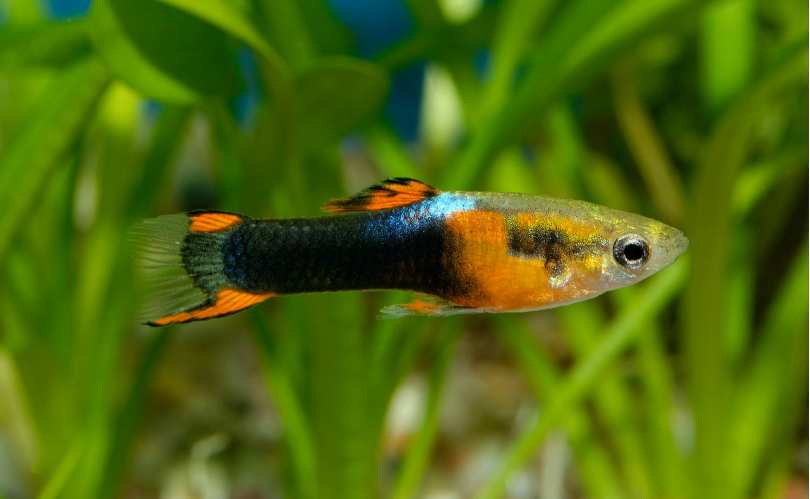
In one laboratory study, Guppies displayed peak activity from 7 am-7 pm under controlled light conditions, with sleep concentrated between 8 pm-4 am. Wild Guppies studied in natural habitats also slept predominantly at night. Their circadian clocks synchronized sleep with sunset and sunrise cues.
Tank-kept Guppies with consistent 14-hour daylight cycles quickly establish corresponding 10-hour nighttime sleep routines. Individual Guppies may show some variability in sleep times, often preferring to rest slightly earlier or later. But most sleep consistently within the same 2-3 hour window.
Sudden disruptions to their light cycle can temporarily alter Guppies’ sleep patterns until the circadian rhythm resets.
So, by noting when your Guppy fish begins resting each evening and waking each morning, you can determine its habitual sleep schedule as an indicator of health and adjustment to the tank environment.
Resuming Normal Behavior After Waking Up
Resuming Normal behavior is a sign Guppy fish exhibit when waking up. Upon waking, Guppies display a 60-80% increase in tail beat frequency, propelling them into active swimming.
Their gill movement accelerates from under 60 breaths/min during sleep to over 180 breaths/min when awake and mobile. Brain wave recordings show activation of sensory regions within minutes of waking as Guppies regain full environmental awareness.
Their visual startle response latency decreases by 150-200 milliseconds, matching daytime reaction times. Social behaviors like schooling, courtship, and aggression resume shortly after waking as energy and alertness levels climb.
Waking Guppies dart rapidly to the surface to gulp air, re-oxygenating after long rest periods. Their metabolism ramps up. Appetite and food-seeking behaviors return, with waking fish swiftly converging on any introduced food.
So, the transition from minimal activity and environmental detachment during sleep to typical awake behaviors helps confirm the Guppy fish has completed its rest phase.
Typical Sleeping Spots for Guppy Fish
Guppy chose a sleeping spot that was safe, secluded, and dark. Sometimes, fish sleep under the leaf. Studies show Guppies strongly prefer sleeping spots with overhead cover, likely to avoid predation. They often wedge themselves underneath leaves or decor.
Dense vegetation like “Java fern, Amazon sword, or water wisteria” provide concealment and support for resting fish. Shaded areas away from direct lighting are favored, allowing the fish to minimize visual exposure.
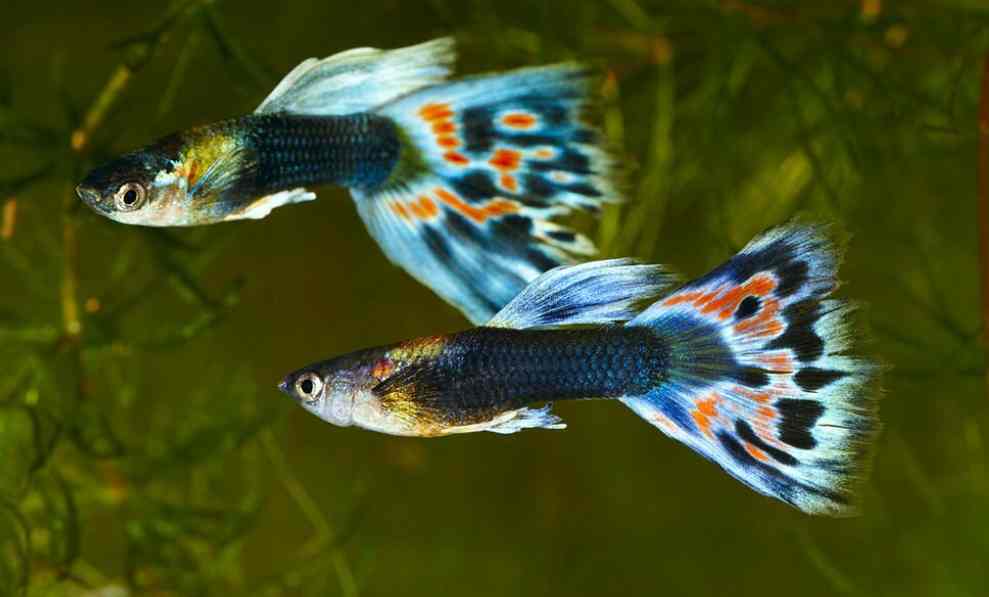
Small crevices in rocks, wood, and commercial hides/caves offer attractive dark sleeping shelters for guppies. Some Guppies acclimate to sleeping near filter outflows. The currents help hold them in place while resting.
Under natural conditions, Guppies sleep wedged into submerged root systems, branches, and other structures. Tank decor mimics these hiding spots. Frequently disturbed zones and direct human observation do not typically locate sleep areas.
Overall, Guppy fish instinctively seek out safe, concealed sleeping areas that allow darkness, stability, and minimal disturbances as they become inactive and vulnerable during sleep.
www.tinyfishtank.com
Good Sleep for Your Guppy Fish
Good sleep helps to increase guppy fish’s lifespan. Guppy fish sleep helps to reduce stress and improve body color too. To arrange good sleep for Guppy, switch off your LED lights. Provide fine-leaved plants like hornwort or Cabomba that Guppies can wedge into while sleeping. Anchor plants firmly so they don’t dislodge.
Use a dimmable LED aquarium light to gradually simulate dusk and dawn when turning the light on and off to respect natural circadian rhythms. Eliminate ambient nighttime light pollution from room fixtures to ensure total darkness for sleeping Guppies.
Maintain stable water temperature between 72-82°F. Rapid temperature shifts can disrupt circadian cycles. Reduce population density if aggression or courtship disrupts sleep. Guppies need rest without disturbances from tankmates.
Perform water changes only during Guppy awake periods to avoid stress from pumping/pouring noises. Supplement the diet with algae or greens to provide nutrients needed for tissue repair during sleep.
With some planning, you can create an ideal Guppy fish environment that promotes healthy, undisturbed sleep critical to their well-being. Monitor their sleeping habits for signs of proper rest.
What Does It Mean If Your Guppy Fish Sleeps Too Much?
Stress, bad water conditions, and health issues can be significant reasons for guppy fish to sleep too much time. Appetite loss Prolonged or excessive sleep in Guppy fish can signify.
Underlying illnesses like “parasites, bacterial infections, or organ dysfunction” cause fatigue and increased rest needs. Poor water quality forces the fish to conserve energy due to toxins, incorrect pH, or insufficient oxygenation.
The nutritional deficiencies can deprive the fish of proteins, lipids, and nutrients for healthy sleep regulation.
- Predation/competition stress if tankmates are bullying, nippy, or domineering, intimidating the Guppy into excessive hiding and sleep.
- As Guppies age, their sleep-related brain regions reduce activity levels, leading to a deterioration of these regions.
- Disruption of circadian cues from irregular light/dark cycles or ambient nighttime lighting interferes with sleep.
- Depression arises from inadequate environmental enrichment and stimuli.
- Recent transport stress if newly introduced to an aquarium.
Careful observation, water testing, and diagnosis can help determine if disease, environment, or other factors are causing your Guppy fish to sleep excessively. Address the underlying issue to restore standard rest patterns.
Distinguishing Between Sleep and Sickness
Finding the difference between sleep and sickness is not easy. After properly examining the duration of sleep or inactivity, we can discover whether guppy fish sleep or suffer illness. Here are some additional tips for distinguishing normal sleep from sickness in Guppy fish.
- Check if the fish is sleeping at the expected times. Illness can cause lethargy and loss of regular circadian rhythms.
- Note gill movement rate – over 160 breaths/min suggests stress or disease versus under 60 during rest.
- Look for equilibrium issues, floating problems, or labored swimming that signal illness or injury.
- Watch if the eyes remain responsive to stimuli when inactive. Unhealthy fish will appear unfocused.
- See if the fish usually eats after waking up. Loss of appetite indicates sickness.
- Monitor for clamped fins, visible swelling, reddening, or raised scales symptomatic of disease.
- Test water parameters – ammonia, nitrites, oxygen, pH, and temperature. Improper levels aggravate the disease.
- Separate the fish for closer observation if sickness seems likely.
- Most critically, note differences from the individual’s standard sleep patterns and activity levels.
With close monitoring and awareness of disease signs, you can discern sickness from healthy sleep in your Guppy fish. Don’t hesitate to move a fish if illness is suspected.
Summary
Guppy fish display behavioral and physiological changes that meet the criteria for a sleep state, albeit through different mechanisms than humans. Their sleep is characterized by minimal movement, slowed respiration, reduced brain activity, altered consciousness, and decreased response to stimuli. Tank-kept Guppies often adhere to a circadian rhythm, sleeping at night and waking during the daytime in sync with light/dark cycles.
Ideal Guppy care includes proper water quality, hideaways, lighting schedules, nutrition, and an undisturbed rest period to promote healthy sleep. Excessive sleep can signify illness, stress, age, or environmental issues, while normal sleep is critical for energy conservation and restoration.
Observing sleep timing, duration, and associated behaviors helps assess proper rest versus potential health problems in pet Guppies. Understanding the sleep habits and needs of Guppy fish allows aquarists to support this critical biological function for their health and well-being.
